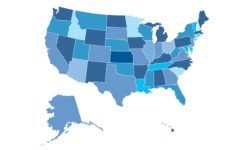Georgia State Updates Its Dorm Security
Urban Atlanta campus upgrades its access control to capitalize on existing physical security infrastructure.

Reporting Features Simplify Security Management
Aside from an access control solution that would work with the university’s existing security equipment, GSU was looking for a solution with superior reporting capabilities.
Campus at a Glance:
- Campus: Georgia State University (GSU) in Atlanta
- Number of Students: 32,000, with 61% of freshmen and 17% of all undergraduates living on campus
- Number of GSU Police Department Employees: 100
- Products Installed: Tyco Security Products, Software House C•CURE 9000 security & event management system; legacy controller upgrade kits
- Systems Integrator: LMI Systems Inc.
“The reporting is exactly what we wanted,” Padilla says. “I can go to an entry log for any access card and see the recent history for a particular card or user as well as who gave the person access to that card. I didn’t have that ability before, and it’s exactly what we need.”
With multiple hall directors and other staff members who are able to create cards for student residents, reliable audit trails and reporting features are essential for the security personnel. For example, if a hall director creates a new card for a student whose card was lost but forgets to flag the previous card as lost, anyone walking around the campus could pick up the card and have access to areas where they are not allowed. With C•CURE 9000, GSU security staff can run daily reports on any users with more than one active card and immediately deactivate the card, as well as find out who created the card without flagging the old one. The security staff member can then bring that to the necessary staff member’s attention to correct the mistake in the future.
“Another benefit is if someone tries to use a flagged card, not only will the card not work, but the system tells us someone is trying to use the card,” Padilla says. The software’s integration with GSU’s surveillance equipment even gives GSU PD a visual on the person.
“We didn’t have good integration between our access control and cameras before,” he explains. “We really wanted this critical enhancement to be able to pull video with an access event. These are key issues because students lose their cards all the time and being in the city of Atlanta, this is an open campus. The safety and security of the students is of utmost importance.”
Receiving the surveillance video from an event allows for quick, informed responses from staff and police in a variety of scenarios and emergencies beyond a lost card.
Aside from the importance of the solution’s capabilities, timing was a big factor toward the successful conversion. GSU’s IT services department began talking about a new access control solution in the spring and needed to be sure everything would be installed over the summer and fully operational before fall classes were back in session.
LMI Systems had the system ready to go within three weeks and spent the summer migrating each housing facility and working on any issues.
“It was a seamless transition,” claims Padilla. “We didn’t have to replace the cards since they were all fully compatible with the new system. It was a matter of recreating the access rights and exporting all the data.”
GSU closed all of its student housing facilities over the summer, with the exception of its largest residence hall, University Commons. Summer access cards were pre-created with access rights, and University Commons was on the new system immediately. The rest of the summer was spent focusing on the other buildings with minimal disruption.
Future Consideration Is a 1-Card System
With the new access control system up and running, GSU officials can now focus on the future. While the current system controls access
to the main entrances of residence facilities, Padilla would like to expand card access to individual rooms for the next dormitory the university builds.
In addition, at some point, GSU officials would like to move to a one-card system, according to Padilla. Currently, students have separate housing cards, library cards and vending/ID cards.
“We’re not quite ready to do that yet, and I don’t know exactly how we will decide to do that, but the student housing solution has been successful,” Padilla adds, “so maybe it will serve as that benchmark we need for the rest of the university.”
Jim Stankevich is global manager for security and Lynx for Tyco Security Products.
If you appreciated this article and want to receive more valuable industry content like this, click here to sign up for our FREE digital newsletters!
 Leading in Turbulent Times: Effective Campus Public Safety Leadership for the 21st Century
Leading in Turbulent Times: Effective Campus Public Safety Leadership for the 21st Century
This new webcast will discuss how campus public safety leaders can effectively incorporate Clery Act, Title IX, customer service, “helicopter” parents, emergency notification, town-gown relationships, brand management, Greek Life, student recruitment, faculty, and more into their roles and develop the necessary skills to successfully lead their departments. Register today to attend this free webcast!







